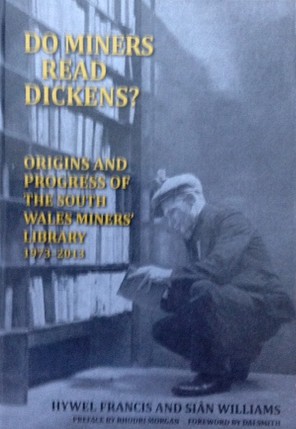Inspiring Older Readers
 posted on 06 Jul 2017
posted on 06 Jul 2017
Do Miners Read Dickens? Origins and Progress of the South Wales Miners’ Library 1973 – 2013 by Hywel Francis and Sian Williams
I think that one of the greatest achievements of the 20th century was the establishment of a workers education movement that not only expanded literacy and numeracy within working class communities but encouraged intellectual curiosity and artistic creativity across a range of cultural forms – literature, painting, theatre and many other fields of endeavour. Although a good number of these initiatives required sponsorship from middle class teachers and academics, the real impetus came from the workers themselves. The emergence of an autodidactic tradition was based not simply on a desire for ‘social mobility’ or on a wish to identify with the values of the middle class but on a recognition that the working class needed education to assert and defend their own values and ethics. Workers marches and trade union demonstrations from the Thirties onwards have proudly displayed banners insisting that knowledge is power and that the right of the worker to education is non-negotiable.
At the very heart of the workers education movement were the Miners trade unions and the British Communist Party and it was from the coalfield communities that outstanding novelists, journalists, painters and politicians emerged, able to tell their own stories and fight for the needs of their communities. Key to this was the establishment of libraries that would make otherwise prohibitively expensive books available to workers and their families to use as they saw fit. This magnificent volume prepared by Hywel Francis and Sian Williams tells the story of the South Wales Miners’ Library in words and pictures.
Dai Smith’s excellent Foreword puts the significance of the libraries into perspective when he points out that these were not just important intellectual hubs but imposing physical spaces that dominated the townscape, challenged only by the chapels:
In the valleys of the South wales coalfield, from east to west, nothing was a more literal representation of intent than the Institutes and Libraries. They were a three dimensional statement of purpose….They dwarfed all the public building that was previous to them…their only rivals were square fronted stone chapels and the red brick barracks of some public houses.
Of course, much has changed since the heyday of the libraries and the mining industry – the pits have been systematically closed and the infrastructure dismantled while the old mining communities have taken years to recover from the loss of jobs and identity that have gone along with these economic changes. The library remains however under the stewardship of Swansea University and this volume traces the highs and lows of its history. The back cover of this large format book sets out the simple origins of the enterprise:
In 1983, two university professors looked slightly bemused as they scanned the shelves of South wales Miners’ Library. One said to the other, ‘Do miners read Dickens?’ We seek to answer that question and a little more besides.
Alongside the contribution the libraries made to the miners’ seemingly never ending battle for decent pay and conditions, what this book shows us is the remarkable richness of working class intellectual life – they not only read Dickens they write and paint their own masterpieces, they create trade union banners of staggering power and beauty and they fight for their principles – the South Wales miners were prominent in their support of the Spanish Republic’s fight against fascism in their civil war. They also provided inspiration for international stars like Paul Robeson who supported the miners' campaigns against poverty and social injustice in the 20s and 30s.
This book is an excellent memento and tribute to the workers library movement and worker education in general. It will, of course, be even more significant to anyone with connections to the South Wales mining communities. Copies can be found on the internet for the unbelievably low price of £10 or thereabout and so it would be almost criminal not to get one.
Terry Potter
July 2017




